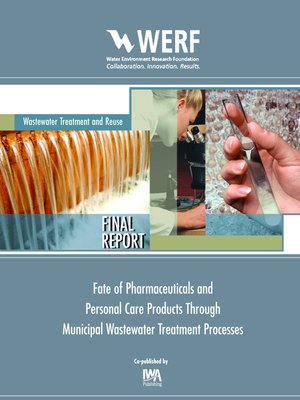Fate of Pharmaceuticals and Personal Care Products Through Municipal Wastewater Treatment Processes
ebook ∣ WERF Research Report
By Roger Stephenson

Sign up to save your library
With an OverDrive account, you can save your favorite libraries for at-a-glance information about availability. Find out more about OverDrive accounts.
Find this title in Libby, the library reading app by OverDrive.



Search for a digital library with this title
Title found at these libraries:
| Library Name | Distance |
|---|---|
| Loading... |
Municipal wastewater treatment facilities were not specifically designed to remove xenobiotics such as endocrine disrupting compounds (EDCs) and pharmaceuticals and personal care products (PPCPs). European studies have described the need for a minimum critical SRT to achieve good removal of EDCs and pharmaceuticals. These studies have presented limited data on PPCPs from full-scale facilities. The objective of this study was to expand published findings to the removal of twenty PPCPs commonly found in the influent of full-scale treatment facilities operating in the United States. The six selected facilities cover operating SRT conditions ranging from 0.5 to 30 days and include facility capacities in excess of 300 mgd. The results demonstrate a wide distribution in both the occurrence of these compounds in the influent to secondary treatment processes and the percentage removal achieved through secondary treatment. The twenty PPCPs were categorized into nine bin combinations of occurrence and treatment reduction. While a large number of these compounds were well removed, one in particular (galaxolide) occurred frequently and was resistant to removal. A minimum critical SRT, defined in this study as the minimum time needed to consistently demonstrate greater than 80 percent removal (SRT80), was determined for the twenty target compounds. SRT80 was compound-dependent with most compounds consistently removed at 5 to 15 days.







